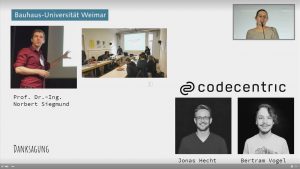Welcome to the Chair of Software Systems

About us
News:
- Seventh episode: Jan Müller (codecentric AG) shares his views on scrum and agile software development. Episode 7: Agile&Scrum.
- Sixth episode: Alexander Rampp (XITASO GmbH) discusses aspects of software quality and goes from code guidelines and principles (e.g. SOLID) over reviews and automation to processes and documentation. Episode 6: SW Quality.
- Fifth episode is out: Carsten Zeitz (REWE Digital) joins me in our talk about software architecture, APIs, communication, and team organization. Episode 5: Architecture.
- Fourth episode of our podcast: Bertram Vogel (codecentric AG) talks about Web development, including CI/CD, testing, monitoring, and tools. Epiosde 4: Web Development
- Third episode of our podcast: Michael Kutz (REWE Digital) presents insights about test-driven development, testing strategies, and challenges when coping with testing in a complex architecture. He also emphasizes the importance of ensemble programming for education at any professional level. Enjoy! Episode 3: Testing
- Second episode of our podcast on software engineering in practice: Jonas Hecht (codecentric AG) talks about the origin of CI/CD and the role of DevOps. We further discuss the trend toward cloud-hosted software and give hints on how to prepare for an industry job&interview. Have fun! Episode 2: CI/CD
- First episode of our podcast on software engineering in practice: Thomas Riegel (converneo GmbH) talks about requirements engineering, customers, and communication challenges. Enjoy! Episode 1: Requirements Engineering
- We received the Open-Source Award 2020 of the state Thuringia (Germany) for our software-engineering teaching project „Ferienpass“. The project brought together students, practitioners from codecentric (Jonas Hecht, Bertram Vogel) and the members of the charity organization Kinderbüro („Kids Office“) Weimar. We developed an open-source solution to register as a child for a holiday ticket online. The students learned foundations of microservices, CI/CD, databases, and Web frontends.

The Chair of Software Systems at Leipzig University develops theory, methods, and tools to automate the development, maintenance, and optimization of reliable, efficient, complex, configurable, and evolvable software systems, including cloud-based systems and AI-based systems. We apply cutting edge techniques from machine learning to the inherent complex problems in software engineering to, for example, reduce energy consumption, improve performance, guide the evolution of software, and support developers in their daily tasks. As for research, our teaching covers fundamental and advanced software engineering topics as well as modern courses on how to develop AI-based and data-centric systems. We advise Bachelor, Master, and PhD theses in these areas, publish in the most renowned conferences and journal, sucessfully receive funding, and collaborate with industry, including codecentric AG, Jetbrains, and REWE Digital.
—
Die Abteilung „Softwaresysteme“ am Institut für Informatik entwickelt Methoden, Werkzeuge und Theorien zur Automatisierung der Konstruktion, Wartung und Optimierung komplexer, konfigurierbarer Softwaresysteme. Besonderer Fokus liegt auf der Entwicklung KI-basierter Softwaresysteme, hoch skalierbare Softwarearchitekturen wie Microservices sowie die Messung und Optimierung von nicht-funktionalen Eigenschaften, wie Performance und Energieverbrauch. Wir explorieren die Schnittstelle zwischen maschinellem Lernen und Software Engineering:
- Software Engineering strebt nach ständiger Automatisierung, Optimierung und Effizienzsteigerung in der Softwareentwicklung. Techniken des maschinellen Lernens können hier helfen neue Einsichten zu gewinnen und Probleme zu lösen, die zu komplex und zu groß sind, um sie manuell zu bewältigen.
- Andererseits können Techniken des Software Engineerings, insbesondere aus dem Bereich des Konfigurations- und Variantenmanagements, helfen, die stetig wachsende Zahl immer komplexerer Methoden im maschinellen Lernen wartbar, einsatzbar und generell beherrschbar zu machen.
Acknowledgements
We acknowledge gratefully the support of the German Research Foundation (DFG) for funding the projects Green Configuration and Pervolution. Moreover, we are grateful for the support of the German Federal Ministry of Education and Research (BMBF) for funding the project Agile AI. Finally, we extend our thanks to the European Social Fund (ESF) and the German state of Saxony for funding the Teaching-AI project.
